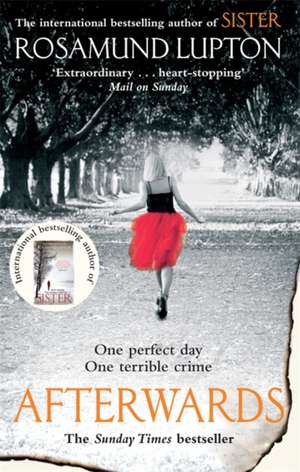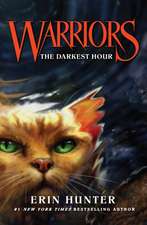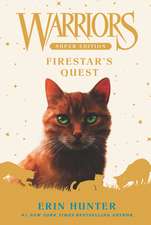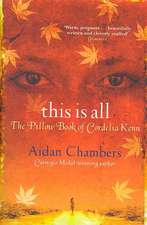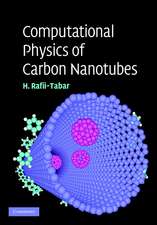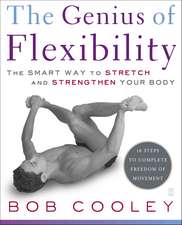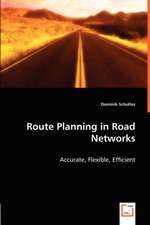Afterwards
Autor Rosamund Luptonen Limba Engleză Paperback – 9 iun 2011
| Toate formatele și edițiile | Preț | Express |
|---|---|---|
| Paperback (2) | 51.50 lei 3-5 săpt. | +29.40 lei 6-12 zile |
| Little Brown Book Group – 9 iun 2011 | 51.50 lei 3-5 săpt. | +29.40 lei 6-12 zile |
| BROADWAY BOOKS – apr 2013 | 110.76 lei 3-5 săpt. |
Preț: 51.50 lei
Preț vechi: 65.30 lei
-21% Nou
Puncte Express: 77
Preț estimativ în valută:
9.85€ • 10.22$ • 8.22£
9.85€ • 10.22$ • 8.22£
Carte disponibilă
Livrare economică 06-20 martie
Livrare express 19-25 februarie pentru 39.39 lei
Preluare comenzi: 021 569.72.76
Specificații
ISBN-13: 9780749942168
ISBN-10: 0749942169
Pagini: 480
Dimensiuni: 130 x 198 x 34 mm
Greutate: 0.38 kg
Editura: Little Brown Book Group
ISBN-10: 0749942169
Pagini: 480
Dimensiuni: 130 x 198 x 34 mm
Greutate: 0.38 kg
Editura: Little Brown Book Group
Extras
1
You were in your important BBC meeting this afternoon, so you won’t have felt the strong warm breeze—“A godsend for sports day,” parents were saying to each other. I thought that even if a God existed, he’d be a little tied up with starving people in Africa or abandoned orphans in Eastern Europe to worry about providing free air-conditioning for Sidley House School’s sack race.
The sun shone on the white lines painted on the grass; the whistles hanging around the teachers’ necks glinted; the children’s hair was shiny-bright. Touchingly too-big feet on small legs bounced on the grass as they did the one-hundred-meter dash, the sack race, the obstacle course. You can’t really see the school from the playing field in summer time—those huge pollarded oaks hide it from view—but I knew a reception class of four-year-olds was still in there and I thought it was a shame the youngest children couldn’t be out enjoying the afternoon too.
Adam was wearing his “I am 8!” badge from our card this morning—just this morning. He came hurrying up to me, that little face of his beaming, because he was off to get his cake from school right now! Rowena had to get the medals so was going with him; Rowena who was at Sidley House with Jenny all those moons ago.
As they left, I looked around to see if Jenny had arrived. I’d thought that after her A-level disaster she should immediately start revision for her retakes, but she still wanted to work at Sidley House to pay for her planned trip to Canada. Strange to think I minded so much.
I’d thought her being a temporary teaching assistant at seventeen was challenge enough—and now she was school nurse for the afternoon. We’d gently crossed swords at breakfast.
“It’s just a little young to have that much responsibility.”
“It’s a primary school sports day, Mum, not a motorway crash.”
But now her shift was almost over—with no accidents at all—and soon she’d be out to join us. I was sure she’d be itching to leave that small stuffy medical room stuck at the top of the school.
I’d noticed at breakfast that she was wearing that red froufrou skirt with a skimpy top and I’d told her it didn’t really look very professional, but when did Jenny ever listen to my advice on clothes?
“Just count your lucky stars I’m not in bumsters.”
“You mean the jeans that hang around boys’ bottoms?”
“Yup.”
“I always want to go and give them a hitch up.”
She bursts out laughing.
And her long legs do look rather wonderful under the too-short, gauzy skirt; and despite myself I feel a little proud. Though she got her long legs from you.
On the playing field, Maisie arrived, her blue eyes sparkling, her face one large smile. Some people dismiss her as slightly eccentric in her fun shirts (long sleeves a different pattern to the rest) but most of us love her.
“Gracie,” she said, giving me a hug. “I’ve come to give Rowena a lift home. She texted me a little while ago, said the tubes were up the spout. So Chauffeur-Mum to the fore!”
“She’s getting the medals,” I told her. “Adam’s gone with her to get his cake. They should be back any minute.”
She smiled. “What kind of cake this year?”
“A chocolate tray-bake. Addie dug out a trench with a teaspoon, and we took off all the candy and replaced it with soldiers. It’s a World War One cake. Which is violent but fits with the curriculum, so I don’t think anyone’ll mind.”
She laughed. “Fantastic.”
“Not really, but he thinks so.”
“Is she your best friend, Mum?” Adam asked me recently.
“Probably, yes,” I said.
Maisie handed me a “little something” for Adam, beautifully wrapped, which I knew would contain a spot-on present. She’s brilliant at presents. It’s one of the many things I love her for. Another is that she ran in the mothers’ race every single year that Rowena was at Sidley House and came in last by a mile every time but didn’t give a hoot! She has never owned a piece of Lycra clothing and, unlike virtually every other mother at Sidley House, has never been inside a gym.
I know. I’m dawdling on that sunny playing field with Maisie. I’m sorry. But it’s hard. What I’m getting to is just so bloody hard.
Maisie left to find Rowena in the school.
I checked my watch; it was almost three.
Still no sign of either Jenny or Adam.
The PE teacher blew his whistle for the last race—the relay—bellowing through his loudspeaker for teams to get in position. I worried that Addie would get into trouble for not being in his designated place.
I looked back at the school, thinking surely I’d see them coming towards me any moment.
Smoke was coming from the school building. Thick black smoke like a bonfire. I remember the calm most of all. The absence of panic. But knowing it was accelerating towards me, like a juggernaut.
I had to hide. Quickly. No. I am not in danger. This terror isn’t for me. My children are in danger.
It hit me in the chest, full on.
There is a fire and they are in there.
They are in there.
And then I was running at the velocity of a scream. Running so hard that I didn’t have time to breathe.
A running scream that can’t stop until I hold them both.
Darting across the road, I heard sirens blaring on the bridge. But the fire engines weren’t moving. There were abandoned cars by the traffic lights blocking their path, and women were getting out of other cars just left in the middle of the road and were running across the bridge towards the school. But all the mothers were at the sports day. What were these women doing, kicking off their high-wedged shoes and tripping over flip-flops and screaming as they ran, like me? I recognized one, the mother of a reception child. They were the mothers of the four-year-olds coming to do their usual pickup. One had left a toddler in her abandoned SUV and the toddler was hitting the window as he watched his mother in this ghastly mothers’ race.
And then I was there first, before the other mothers because they still had to cross the road and run down the drive.
And the four-year-olds were lined up outside the school with their teacher, a neat little two-by-two line; and Maisie was with the teacher, with her arm around her, and I saw how shaken the teacher looked. Behind them black smoke poured out of the school like a factory chimneystack, staining the summer-blue sky.
And Adam was outside—outside!—by that bronze statue—and he was sobbing against Rowena and she was holding him tightly. And in that moment of relief, love flooded out from me not only onto my boy but onto the girl who was comforting him.
I allowed myself a second, maybe two, to feel gut-wrenching relief for Adam and then I was looking for Jenny. Bobbed blond hair, slender. No one like Jenny outside. From the bridge the sirens wailed.
And the four-year-olds were starting to cry as they saw their mothers, running full tilt towards them down the drive, tears streaming down their faces, arms outstretched, waiting for that moment to hold their child.
And I turned towards the burning building, black smoke billowing out of the classrooms on the second and third floors.
Jenny.
2
I ran up the main steps to the school and opened the door into the small vestibule, and for a moment everything was normal. There was that framed photo on the wall of the first pupils at Sidley House, smiling their baby teeth smiles. (Rowena exceptionally pretty then, Jenny our gawky little duckling.) There was the day’s lunch menu, with pictures as well as words: fish pie and peas. And I was overwhelmingly reassured. It was like coming into school every morning.
I tried to open the door from the vestibule into the school itself. For the first time I realized how heavy it was. A fire door. My hands were shaking too hard to get a grip on the handle properly. And it was hot. I’d had my shirtsleeves rolled high up. I unrolled them and tugged them over my hand. Then I pulled the door open.
I screamed her name. Over and over. And each time I screamed her name, smoke came into my mouth and throat and lungs until I couldn’t scream anymore.
The sound of burning, hissing, and spitting; a giant serpent of fire coiling through the building.
Above me something collapsed. I heard and felt the thud.
And then a roar of rage as the fire discovered fresh oxygen.
The fire was above me.
Jenny was above me.
I could just see my way to the stairs. I started climbing them, the heat getting stronger, the smoke thicker.
I got to the first floor.
The heat punched me full in the body and face.
I couldn’t see anything—blacker than hell.
I had to get to the third floor.
To Jenny.
The smoke went into my lungs, and I was breathing barbed wire.
I dropped onto my hands and knees, remembering from some distant fire drill at my old school that this is where oxygen is found. By some small miracle I found I could breathe.
I crawled forwards, a blind person without a stick, fingers tapping in front of me, trying to find the next flight of stairs. I ought to have been crossing the reading area with the huge, brightly colored rug. I felt the rug under my fingers, the nylon melting and crinkling in the heat, and my fingertips were burning. I was afraid my fingertips would soon be too burnt to feel. I was like the man in Adam’s mythology book, holding on to Ariadne’s thread to find his way out of the labyrinth—only my thread was a melting rug.
I reached the end of the rug and felt the texture change, and then I felt the first step.
I began to climb the stairs up to the second floor, on my hands and knees, keeping my face down to the oxygen.
And all the time I was refusing to believe it could really be happening. This place was soft-cheeked children and fidgeting on the stairs and washing lines strung up across classrooms with flying pennants of children’s drawings. It was reading books and chapter books and beanbags and fruit cut up into slices at snack time.
It was safe.
Another step.
All around me I heard and felt chunks of Jenny’s and Adam’s childhoods crashing down.
Another step.
I felt dizzy, poisoned by something in the smoke.
Another step.
It was a battle. Me against this living, breathing fire that wanted to kill my child.
Another step.
I knew I’d never get to the third floor, that it would kill me before I could reach her.
I felt her at the top of the stairs. She had managed to get down one flight.
She was my little girl and I was here and everything was going to be all right now.
“Jenny?”
She didn’t speak or move and the fire’s roar was getting closer and I couldn’t breathe much longer.
I tried to pick her up as if she was still tiny, but she was too heavy.
I dragged her down the stairs, trying to use my body to shield her from the heat and smoke. I wouldn’t think how badly hurt she was. Not yet. Not till the bottom of the stairs. Not until she was safe.
I cried to you, silently, as if by telepathy I could summon you to help us.
And as I dragged her, step by step, down the stairs, trying to get away from burning heat and raging flames and smoke, I thought of love. I held on to it. And it was cool and clear and quiet.
Maybe there was telepathy between us, because at that moment you must have been in your meeting with the BBC commissioning editors about the follow-up to your Hostile Environments series. You’d done sweltering, steamy jungles and blazing, arid deserts, and you wanted the next series to be in the contrasting frozen wilds of Antarctica. So maybe it was you who helped me envisage a silent, white acreage of love as I dragged Jenny down the stairs.
But before I reached the bottom, something hit me, throwing me forwards, and everything went dark.
As I lost consciousness I talked to you.
I said, “An unborn baby doesn’t need air at all, did you know that?” I thought you probably didn’t. When I was pregnant with Jenny, I found out everything I could, but you were too impatient for her to arrive to bother with her prologue. So you don’t know that an unborn baby, swimming around in amniotic fluid, can’t take a breath or she would drown. There aren’t any temporary gills so that she can swim, fishlike, until birth. No, the baby gets her oxygen from the umbilical cord attached to her mother. I felt like an oxygen supply attached to a tiny, intrepid diver.
But the moment she was born, the oxygen supply was cut off and she entered the new element of air. There was a moment of silence, a precipitous second, as if she stood on the edge of life, deciding. In the old days they used to slap the baby to hear the reassuring yell of lungs filled with air. Nowadays they look closely to see the minute rise of a baby-soft chest, and listen to the whispering—in and out—to know that life in the new medium of air has begun.
And then I cried and you cheered—actually cheered!—and the baby equipment trolley was wheeled out, no need for that now. A normal delivery. A healthy infant. To join all the billions of others on the planet who breathe, in and out, without thinking about it.
The next day your sister sent me a bouquet of roses with Gypsophila, known as “baby’s breath,” sprays of pretty white flowers. But a newborn baby’s breath is finer than a single parachute from a blown dandelion clock.
You told me once that when you lose consciousness, the last of the senses to go is hearing. In the darkness I thought I heard Jenny take a dandelion-clock breath.
You were in your important BBC meeting this afternoon, so you won’t have felt the strong warm breeze—“A godsend for sports day,” parents were saying to each other. I thought that even if a God existed, he’d be a little tied up with starving people in Africa or abandoned orphans in Eastern Europe to worry about providing free air-conditioning for Sidley House School’s sack race.
The sun shone on the white lines painted on the grass; the whistles hanging around the teachers’ necks glinted; the children’s hair was shiny-bright. Touchingly too-big feet on small legs bounced on the grass as they did the one-hundred-meter dash, the sack race, the obstacle course. You can’t really see the school from the playing field in summer time—those huge pollarded oaks hide it from view—but I knew a reception class of four-year-olds was still in there and I thought it was a shame the youngest children couldn’t be out enjoying the afternoon too.
Adam was wearing his “I am 8!” badge from our card this morning—just this morning. He came hurrying up to me, that little face of his beaming, because he was off to get his cake from school right now! Rowena had to get the medals so was going with him; Rowena who was at Sidley House with Jenny all those moons ago.
As they left, I looked around to see if Jenny had arrived. I’d thought that after her A-level disaster she should immediately start revision for her retakes, but she still wanted to work at Sidley House to pay for her planned trip to Canada. Strange to think I minded so much.
I’d thought her being a temporary teaching assistant at seventeen was challenge enough—and now she was school nurse for the afternoon. We’d gently crossed swords at breakfast.
“It’s just a little young to have that much responsibility.”
“It’s a primary school sports day, Mum, not a motorway crash.”
But now her shift was almost over—with no accidents at all—and soon she’d be out to join us. I was sure she’d be itching to leave that small stuffy medical room stuck at the top of the school.
I’d noticed at breakfast that she was wearing that red froufrou skirt with a skimpy top and I’d told her it didn’t really look very professional, but when did Jenny ever listen to my advice on clothes?
“Just count your lucky stars I’m not in bumsters.”
“You mean the jeans that hang around boys’ bottoms?”
“Yup.”
“I always want to go and give them a hitch up.”
She bursts out laughing.
And her long legs do look rather wonderful under the too-short, gauzy skirt; and despite myself I feel a little proud. Though she got her long legs from you.
On the playing field, Maisie arrived, her blue eyes sparkling, her face one large smile. Some people dismiss her as slightly eccentric in her fun shirts (long sleeves a different pattern to the rest) but most of us love her.
“Gracie,” she said, giving me a hug. “I’ve come to give Rowena a lift home. She texted me a little while ago, said the tubes were up the spout. So Chauffeur-Mum to the fore!”
“She’s getting the medals,” I told her. “Adam’s gone with her to get his cake. They should be back any minute.”
She smiled. “What kind of cake this year?”
“A chocolate tray-bake. Addie dug out a trench with a teaspoon, and we took off all the candy and replaced it with soldiers. It’s a World War One cake. Which is violent but fits with the curriculum, so I don’t think anyone’ll mind.”
She laughed. “Fantastic.”
“Not really, but he thinks so.”
“Is she your best friend, Mum?” Adam asked me recently.
“Probably, yes,” I said.
Maisie handed me a “little something” for Adam, beautifully wrapped, which I knew would contain a spot-on present. She’s brilliant at presents. It’s one of the many things I love her for. Another is that she ran in the mothers’ race every single year that Rowena was at Sidley House and came in last by a mile every time but didn’t give a hoot! She has never owned a piece of Lycra clothing and, unlike virtually every other mother at Sidley House, has never been inside a gym.
I know. I’m dawdling on that sunny playing field with Maisie. I’m sorry. But it’s hard. What I’m getting to is just so bloody hard.
Maisie left to find Rowena in the school.
I checked my watch; it was almost three.
Still no sign of either Jenny or Adam.
The PE teacher blew his whistle for the last race—the relay—bellowing through his loudspeaker for teams to get in position. I worried that Addie would get into trouble for not being in his designated place.
I looked back at the school, thinking surely I’d see them coming towards me any moment.
Smoke was coming from the school building. Thick black smoke like a bonfire. I remember the calm most of all. The absence of panic. But knowing it was accelerating towards me, like a juggernaut.
I had to hide. Quickly. No. I am not in danger. This terror isn’t for me. My children are in danger.
It hit me in the chest, full on.
There is a fire and they are in there.
They are in there.
And then I was running at the velocity of a scream. Running so hard that I didn’t have time to breathe.
A running scream that can’t stop until I hold them both.
Darting across the road, I heard sirens blaring on the bridge. But the fire engines weren’t moving. There were abandoned cars by the traffic lights blocking their path, and women were getting out of other cars just left in the middle of the road and were running across the bridge towards the school. But all the mothers were at the sports day. What were these women doing, kicking off their high-wedged shoes and tripping over flip-flops and screaming as they ran, like me? I recognized one, the mother of a reception child. They were the mothers of the four-year-olds coming to do their usual pickup. One had left a toddler in her abandoned SUV and the toddler was hitting the window as he watched his mother in this ghastly mothers’ race.
And then I was there first, before the other mothers because they still had to cross the road and run down the drive.
And the four-year-olds were lined up outside the school with their teacher, a neat little two-by-two line; and Maisie was with the teacher, with her arm around her, and I saw how shaken the teacher looked. Behind them black smoke poured out of the school like a factory chimneystack, staining the summer-blue sky.
And Adam was outside—outside!—by that bronze statue—and he was sobbing against Rowena and she was holding him tightly. And in that moment of relief, love flooded out from me not only onto my boy but onto the girl who was comforting him.
I allowed myself a second, maybe two, to feel gut-wrenching relief for Adam and then I was looking for Jenny. Bobbed blond hair, slender. No one like Jenny outside. From the bridge the sirens wailed.
And the four-year-olds were starting to cry as they saw their mothers, running full tilt towards them down the drive, tears streaming down their faces, arms outstretched, waiting for that moment to hold their child.
And I turned towards the burning building, black smoke billowing out of the classrooms on the second and third floors.
Jenny.
2
I ran up the main steps to the school and opened the door into the small vestibule, and for a moment everything was normal. There was that framed photo on the wall of the first pupils at Sidley House, smiling their baby teeth smiles. (Rowena exceptionally pretty then, Jenny our gawky little duckling.) There was the day’s lunch menu, with pictures as well as words: fish pie and peas. And I was overwhelmingly reassured. It was like coming into school every morning.
I tried to open the door from the vestibule into the school itself. For the first time I realized how heavy it was. A fire door. My hands were shaking too hard to get a grip on the handle properly. And it was hot. I’d had my shirtsleeves rolled high up. I unrolled them and tugged them over my hand. Then I pulled the door open.
I screamed her name. Over and over. And each time I screamed her name, smoke came into my mouth and throat and lungs until I couldn’t scream anymore.
The sound of burning, hissing, and spitting; a giant serpent of fire coiling through the building.
Above me something collapsed. I heard and felt the thud.
And then a roar of rage as the fire discovered fresh oxygen.
The fire was above me.
Jenny was above me.
I could just see my way to the stairs. I started climbing them, the heat getting stronger, the smoke thicker.
I got to the first floor.
The heat punched me full in the body and face.
I couldn’t see anything—blacker than hell.
I had to get to the third floor.
To Jenny.
The smoke went into my lungs, and I was breathing barbed wire.
I dropped onto my hands and knees, remembering from some distant fire drill at my old school that this is where oxygen is found. By some small miracle I found I could breathe.
I crawled forwards, a blind person without a stick, fingers tapping in front of me, trying to find the next flight of stairs. I ought to have been crossing the reading area with the huge, brightly colored rug. I felt the rug under my fingers, the nylon melting and crinkling in the heat, and my fingertips were burning. I was afraid my fingertips would soon be too burnt to feel. I was like the man in Adam’s mythology book, holding on to Ariadne’s thread to find his way out of the labyrinth—only my thread was a melting rug.
I reached the end of the rug and felt the texture change, and then I felt the first step.
I began to climb the stairs up to the second floor, on my hands and knees, keeping my face down to the oxygen.
And all the time I was refusing to believe it could really be happening. This place was soft-cheeked children and fidgeting on the stairs and washing lines strung up across classrooms with flying pennants of children’s drawings. It was reading books and chapter books and beanbags and fruit cut up into slices at snack time.
It was safe.
Another step.
All around me I heard and felt chunks of Jenny’s and Adam’s childhoods crashing down.
Another step.
I felt dizzy, poisoned by something in the smoke.
Another step.
It was a battle. Me against this living, breathing fire that wanted to kill my child.
Another step.
I knew I’d never get to the third floor, that it would kill me before I could reach her.
I felt her at the top of the stairs. She had managed to get down one flight.
She was my little girl and I was here and everything was going to be all right now.
“Jenny?”
She didn’t speak or move and the fire’s roar was getting closer and I couldn’t breathe much longer.
I tried to pick her up as if she was still tiny, but she was too heavy.
I dragged her down the stairs, trying to use my body to shield her from the heat and smoke. I wouldn’t think how badly hurt she was. Not yet. Not till the bottom of the stairs. Not until she was safe.
I cried to you, silently, as if by telepathy I could summon you to help us.
And as I dragged her, step by step, down the stairs, trying to get away from burning heat and raging flames and smoke, I thought of love. I held on to it. And it was cool and clear and quiet.
Maybe there was telepathy between us, because at that moment you must have been in your meeting with the BBC commissioning editors about the follow-up to your Hostile Environments series. You’d done sweltering, steamy jungles and blazing, arid deserts, and you wanted the next series to be in the contrasting frozen wilds of Antarctica. So maybe it was you who helped me envisage a silent, white acreage of love as I dragged Jenny down the stairs.
But before I reached the bottom, something hit me, throwing me forwards, and everything went dark.
As I lost consciousness I talked to you.
I said, “An unborn baby doesn’t need air at all, did you know that?” I thought you probably didn’t. When I was pregnant with Jenny, I found out everything I could, but you were too impatient for her to arrive to bother with her prologue. So you don’t know that an unborn baby, swimming around in amniotic fluid, can’t take a breath or she would drown. There aren’t any temporary gills so that she can swim, fishlike, until birth. No, the baby gets her oxygen from the umbilical cord attached to her mother. I felt like an oxygen supply attached to a tiny, intrepid diver.
But the moment she was born, the oxygen supply was cut off and she entered the new element of air. There was a moment of silence, a precipitous second, as if she stood on the edge of life, deciding. In the old days they used to slap the baby to hear the reassuring yell of lungs filled with air. Nowadays they look closely to see the minute rise of a baby-soft chest, and listen to the whispering—in and out—to know that life in the new medium of air has begun.
And then I cried and you cheered—actually cheered!—and the baby equipment trolley was wheeled out, no need for that now. A normal delivery. A healthy infant. To join all the billions of others on the planet who breathe, in and out, without thinking about it.
The next day your sister sent me a bouquet of roses with Gypsophila, known as “baby’s breath,” sprays of pretty white flowers. But a newborn baby’s breath is finer than a single parachute from a blown dandelion clock.
You told me once that when you lose consciousness, the last of the senses to go is hearing. In the darkness I thought I heard Jenny take a dandelion-clock breath.
Recenzii
“A bold, impossible-to-categorize, and riveting blend of psychological suspense, literary thriller and the paranormal…Afterwards proves that Lupton isn't just good — she's wickedly good."
—Seattle Times
“A gripping novel.”
—New York Times Book Review
“Lupton’s finely wrought portrait of motherly love is genuinely moving.”
—Boston Globe
“Readers...will be equally smitten with Afterwards, as much an homage to the mother-daughter relationship as it is a crime novel...There are so many twists, turns and heartbreaks in this tragic, tense novel.”
—USA Today
“With its hint of a Jodi Picoult family saga blended with an eerie Ruth Rendell mystery, Afterwards should appeal to readers of both genres.”
—BookPage
“Lupton takes her readers on a totally harrowing ride as she melds a suspenseful procedure with an emotionally fraught drama. Within a taut and sinuous narrative, heartbreak over a broken family vies with fear that the arsonist will return…Masterful pacing and a highly charged atmosphere combine to make this an exceptionally gripping read.”
—Booklist, starred review
“Lupton's dexterity at handling the subplots and possible suspects is dazzling. … Lupton creates such lovely, believable feelings in all of her characters…that what's ostensibly a supernatural story feels very, very human.”
—Oprah.com
“Excellent and full of plot twists.”
—The Daily American
"Lupton’s superb follow-up to Sister…The uncommon but convincing narrative technique, adroit twists, and memorable characters combine to provide a wise and poignant portrait of a family confronted with malice and heartbreaking decisions.”
—Publishers Weekly, starred review
“A wonderful mix of smart thriller with tear-provoking literature; a fine blend of Jodi Picoult and P.D. James…Lupton has written a riveting story that will resonate with readers long after they have turned the last page.”
—Library Journal, starred review
“A full-throttle psychological thriller, ring-fenced by a mother’s love…With each turn of the page, Lupton seems to add another element and motive to the mix…This compulsive read confirms Lupton’s instinctive commercial flair.”
—Kirkus
"The author of the outstanding Sister has done it again - in fact she's outdone herself. It's hard to come up with enough superlatives to do justice to Afterwards, a brilliant mystery where the two key investigators are both in a coma....Rush out to get a copy - and add Sister too if you haven't discovered it yet. They are both brilliant reads.”
—Bookloons.com
“Rosamund Lupton (Sister) offers up an intricately plotted combination of thriller, speculative fiction and mother-daughter celebration in Afterwards…Lupton delivers a top-notch mystery with red herrings galore; even the most seasoned mystery reader will do a double-take at the arsonist's identity. However, the rich emotional topography is the most spellbinding feature in Afterwards. At its heart, Lupton's story deals with parents and children, the bonds that allow family members to share their joy and their pain and the struggle parents face between wanting their offspring to stay children forever and needing to let go…Readers are encouraged to grab a box of Kleenex, put Mom on speed dial and discover what comes afterwards.”
—Shelf Awareness
“Afterwards is an exceptional literary thriller that resonates with depth and despair. It’s got it all: a gripping plot with twists and turns, a horrific crime, and a beautiful love story layered into the fine fabric of a family, who are torn apart by a devastating betrayal.”
—Chevy Stevens, New York Times bestselling author of Still Missing and Never Knowing
“In Afterwards, we see a master's touch on every page. Uncompromising emotional impact, a poet’s sonorous style and a gripping story all come together to make this a transcendent literary experience. I guarantee this novel will touch everyone.”
—Jeffery Deaver, New York Times bestselling author of Carte Blanche and Edge
“Brilliantly conceived and executed, Afterwards asks a mother's most terrifying question: what if your children were in mortal danger and you were unable to do a thing to save them? It's a heartbreaking and fearless journey that proves once again: Rosamund Lupton is truly a force to be reckoned with.”
—Carla Buckley, author of The Things That Keep Us Here
—Seattle Times
“A gripping novel.”
—New York Times Book Review
“Lupton’s finely wrought portrait of motherly love is genuinely moving.”
—Boston Globe
“Readers...will be equally smitten with Afterwards, as much an homage to the mother-daughter relationship as it is a crime novel...There are so many twists, turns and heartbreaks in this tragic, tense novel.”
—USA Today
“With its hint of a Jodi Picoult family saga blended with an eerie Ruth Rendell mystery, Afterwards should appeal to readers of both genres.”
—BookPage
“Lupton takes her readers on a totally harrowing ride as she melds a suspenseful procedure with an emotionally fraught drama. Within a taut and sinuous narrative, heartbreak over a broken family vies with fear that the arsonist will return…Masterful pacing and a highly charged atmosphere combine to make this an exceptionally gripping read.”
—Booklist, starred review
“Lupton's dexterity at handling the subplots and possible suspects is dazzling. … Lupton creates such lovely, believable feelings in all of her characters…that what's ostensibly a supernatural story feels very, very human.”
—Oprah.com
“Excellent and full of plot twists.”
—The Daily American
"Lupton’s superb follow-up to Sister…The uncommon but convincing narrative technique, adroit twists, and memorable characters combine to provide a wise and poignant portrait of a family confronted with malice and heartbreaking decisions.”
—Publishers Weekly, starred review
“A wonderful mix of smart thriller with tear-provoking literature; a fine blend of Jodi Picoult and P.D. James…Lupton has written a riveting story that will resonate with readers long after they have turned the last page.”
—Library Journal, starred review
“A full-throttle psychological thriller, ring-fenced by a mother’s love…With each turn of the page, Lupton seems to add another element and motive to the mix…This compulsive read confirms Lupton’s instinctive commercial flair.”
—Kirkus
"The author of the outstanding Sister has done it again - in fact she's outdone herself. It's hard to come up with enough superlatives to do justice to Afterwards, a brilliant mystery where the two key investigators are both in a coma....Rush out to get a copy - and add Sister too if you haven't discovered it yet. They are both brilliant reads.”
—Bookloons.com
“Rosamund Lupton (Sister) offers up an intricately plotted combination of thriller, speculative fiction and mother-daughter celebration in Afterwards…Lupton delivers a top-notch mystery with red herrings galore; even the most seasoned mystery reader will do a double-take at the arsonist's identity. However, the rich emotional topography is the most spellbinding feature in Afterwards. At its heart, Lupton's story deals with parents and children, the bonds that allow family members to share their joy and their pain and the struggle parents face between wanting their offspring to stay children forever and needing to let go…Readers are encouraged to grab a box of Kleenex, put Mom on speed dial and discover what comes afterwards.”
—Shelf Awareness
“Afterwards is an exceptional literary thriller that resonates with depth and despair. It’s got it all: a gripping plot with twists and turns, a horrific crime, and a beautiful love story layered into the fine fabric of a family, who are torn apart by a devastating betrayal.”
—Chevy Stevens, New York Times bestselling author of Still Missing and Never Knowing
“In Afterwards, we see a master's touch on every page. Uncompromising emotional impact, a poet’s sonorous style and a gripping story all come together to make this a transcendent literary experience. I guarantee this novel will touch everyone.”
—Jeffery Deaver, New York Times bestselling author of Carte Blanche and Edge
“Brilliantly conceived and executed, Afterwards asks a mother's most terrifying question: what if your children were in mortal danger and you were unable to do a thing to save them? It's a heartbreaking and fearless journey that proves once again: Rosamund Lupton is truly a force to be reckoned with.”
—Carla Buckley, author of The Things That Keep Us Here
Notă biografică
ROSAMUND LUPTON lives with her husband and two sons in London. She is the author of the critically acclaimed New York Times bestseller Sister.
